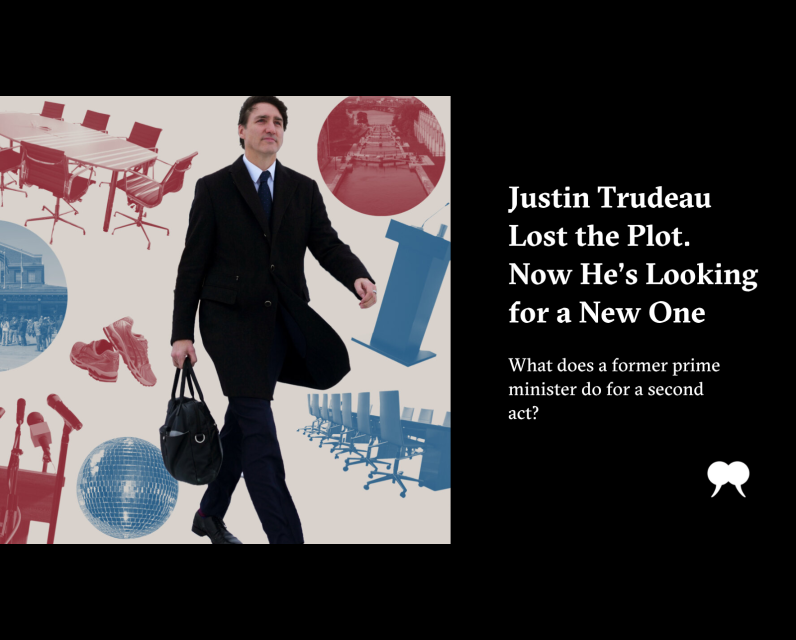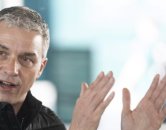Source Feed: Walrus
Author: Wendy Kaur
Publication Date: June 16, 2025 - 06:30
Justin Trudeau Lost the Plot. Now He’s Looking for a New One
June 16, 2025

Stephen Maher’s book The Prince: The Turbulent Reign of Justin Trudeau landed in spring 2024, just as the then prime minister’s brand was in free fall. The year before, he had announced his separation from his wife, Sophie Grégoire Trudeau. Then, last September, a no-confidence vote was tabled by the Conservatives. Trudeau survived it, as well as two more no-confidence motions in subsequent months. But in late December, one-third of his own caucus called for him to step down. “Canadians had had enough of him—I kept saying that as I was trying to sell the book,” Maher says. “He had lost his connection with the people.”
Maher points to the act that triggered the caucus dissent: “Chrystia stuck the knife in him,” he tells me from Nova Scotia. Of course, Maher is referring to Chrystia Freeland, Trudeau’s deputy prime minister at the time, who resigned on December 16 after she was demoted from finance minister to another cabinet position. To add insult to injury, Freeland posted her scathing resignation letter on social media. “It had to have been crushing,” says Maher. “Everybody else could see there wasn’t a way back from it, but it took him some time to realize that he was done.”
To be sure, Trudeau needed weeks over the holidays to see the writing on the wall—and to finally accept what that meant for him. Maher says this reluctance, defiance even, isn’t unique to Trudeau: “People in the most powerful positions tend to get swallowed up by them to the extent that they find it difficult to bow out gracefully. For the most part, they’re all forced out. We know Trudeau’s state of mind at that time was that he could not accept that Canadians wanted him to go.”
There was a lot to process. “He had lost his marriage, strained long-term friendships, consumed all his political capital, and then found himself standing there, spent,” says Maher.
The Liberals winning the election was his saving grace. “It looked like, a few months ago, the Liberals were going to get destroyed—which would have reflected badly on him,” journalist Lawrence Martin told me.
Since Mark Carney claimed victory, Trudeau has been able to better enjoy his downtime, says Martin. “Post-PM life, I’m told, he’s in good spirits.”
Trudeau’s long-time friend Terry DiMonte, who co-hosts Standing By: The Terry and Ted Podcast, adds, “My pal is opting for quiet for now, and lord knows he deserves it!”
Though it’s only been a few months since Trudeau stepped down, he might actually be feeling restless, says Arthur Milnes, a former speechwriter for Trudeau’s predecessor, Stephen Harper. Milnes, who was also a research assistant to the late Brian Mulroney for his memoir, takes a special interest in the lives of prime ministers after they leave office. “Picture what these men and women go through,” Milnes tells me from Kingston, Ontario. “You’re going hundreds of miles an hour for however long you’re the prime minister. And then it just stops.”
Trudeau could even be suffering from empty-suit syndrome. “It’s fairly common for anyone who has a high-profile job,” Maher says. “I think men, especially, tend to identify themselves so much with their work. Now it’s ‘Who am I?’ and ‘What am I doing?’”
It’s no wonder then that many of Trudeau’s predecessors, including his father, were eager to return to professional life as quickly as possible. Just a couple of months after Pierre Elliott Trudeau handed over power in June 1984, he went to work at the now-defunct law firm Heenan Blaikie in Montreal. Similarly, Mulroney, who left office in February 1993, was back at his old Montreal law firm, Ogilvy Renault (now Norton Rose Fulbright), that same year.
The younger Trudeau may not seem someone destined for a low-key role, but the worst thing he could do right now is come back on the scene, says Maher. “He would be well advised not to play a prominent role in Canada for some time. People are still tired—exhausted—of him and blame him for a lot of things.”
The rest of the world doesn’t always see our leaders the way we do, Milnes reminds me. At home, they might be polarizing or diminished, but abroad, they are regarded as seasoned global players. “Trudeau and Harper spent ten years at the world’s most exclusive table: the G-7,” he says—not to mention membership in the Commonwealth and La Francophonie. These roles build deep networks and experience that don’t disappear after they leave office, he says. “Often prime ministers do a lot of international work in the business world because the rest of the world recognizes their unique contacts and experiences.”
Milnes uses Mulroney as an example. “He became a giant in the business world post-premiership, even though when he left office, he was very unpopular in the political sense. The rest of the world grabbed him.” Mulroney went on to become an international business consultant and served on the boards of a number of corporations.
Trudeau could even look to his grandfather’s example. “We always talk about him as being the son of Pierre Trudeau, but his maternal grandfather, James Sinclair, was an important politician,” adds Milnes. A cabinet minister under prime minister Louis St-Laurent, Sinclair’s experience as a Royal Canadian Air Force squadron leader during World War II as well as his work as the minister of fisheries made him invaluable in boardrooms.
It’s hard to say if Trudeau has an instinct for private sector work in the conventional sense, but Milnes takes stock of a different skill set that could still be sought after, at least in the rest of the world if not here at home. “I don’t mean this the way it sounds, but he’s very good at selling things. He was a great campaigner, and he can fire people up in the positive sense, so he might carve out a role advocating for causes that mean a lot to him.”
Add to that a prepossessing charm and winsome personality. Maher’s biography of Trudeau is an unauthorized one, but he was able to get an interview with Trudeau at the PMO in early 2024. “He disarmed me—which is what he does well. He’s a very charming person.”
Trudeau also enjoys a kind of celebrity status. “He has name recognition in China, Japan, India, and in Europe,” adds Maher. “He is a globally famous person.”
It makes sense then, at least in the foreseeable future, that Trudeau would point his ambitions to the world stage. “I’m told that once the dust settles, he will be active on the international speaking circuit,” says Martin, who refrained from naming his source. “He’ll command a very high fee.”
He already has a host of experience on that front. Before he ran for leadership of the Liberal Party in 2013, Trudeau had a very successful public-speaking business—although some of it was controversial at the time as critics said he shouldn’t have accepted payment for speaking engagements once he became an MP in 2008.
Taking the speaking route is certainly an avenue that some former prime ministers take, says Milnes. “It’s not as lucrative as for the Clintons or the W. Bushes and the Obamas: those ones are just selling the presidency and making millions. Canadian prime ministers get nothing like that, but it can still be quite well paid.” He adds that past prime ministers have devoted their best earning years to politics, so they do feel they want to make money, particularly for their families.
As far as his personal life goes, there have been media quips about Trudeau officially entering his “divorced dad era.” Days after Carney took over as prime minister in March, Trudeau posted an Instagram selfie that showed him shopping at Canadian Tire—a patriotic gesture and simultaneous jab at United States president Donald Trump and his tariff threats. Many of us have also seen the video of Trudeau hanging out with his oldest son, Xavier, as they watch his newly released music video.
Speaking of divorce, the ex–prime minister and Sophie Grégoire Trudeau haven’t quite taken that step—they are still legally married—and he is keeping the company of another party. In an X post earlier this month, Martin claimed that Trudeau is romantically involved with someone in St. John’s, Newfoundland. “As everyone might guess, there is a lady friend,” he told me.
Trudeau’s long game might involve Ottawa. “Robert Borden stayed around Ottawa after leaving office, as did Joe Clark and Jean Chrétien. I would argue this is important because it means they become part of the culture,” says Milnes. “Sometimes they’re turned to for advice—both political and non-political. The city can have a positive impact on your legacy, just for the simple reason you’re there. ”
It should be stated that a comeback the likes of which Trump experienced won’t be in the cards for Trudeau. “Unlike Donald Trump, he has no constituency,” says Maher.
Never say never, asserts Milnes, reminding us of two great political resurrections in Canadian history. “[William Lyon] Mackenzie King was kicked out in 1930 but stayed as the opposition leader and returned to power in 1935,” he says. Before him, Sir John A. Macdonald himself was quite deservedly tossed out of Parliament in 1873 because of the Pacific Scandal, in which his Conservative government accepted large campaign donations in exchange for the contract to build the Canadian Pacific Railway. “Then he made the most incredible comeback and returned to power in 1878 until he died in 1891.” Arthur Meighen also engineered a successful return as prime minister, even though his last term only lasted from 1920 to ’21.
There is a road back to public acceptance in Canada, but it would require some time, acknowledges Maher. “How can we miss you if you don’t leave?”
And yet, even after nearly a decade in power, Trudeau remains oddly unknowable. When Maher interviewed him for his book last year, he didn’t feel like he connected with the “real” Trudeau. “He has grown up in the public eye, so he wears a mask and has skin like a crocodile. He has to. He’s a mysterious and remote figure. In our interview, I had to find little ways of drawing him out.”
At the same time, Trudeau isn’t too fussed by any negative sentiment surrounding him—from friend or foe. “Trudeau’s ego is extraordinarily healthy,” notes Maher. “Unlike a lot of other politicians, I think he’s got a kind of inner serenity. He knows he’s an extraordinary creature—or however he sees himself. So if Mark Carney criticizes him or somebody writes a book about him, it doesn’t really bother him in the way these things would bother Stephen Harper.”
That quality was on full display when Trudeau appeared at King Charles’s throne speech wearing running shoes—an outfit choice that sparked a mini furor. Some read it as casual disrespect; to others, it was just another sign that Trudeau doesn’t much care what people think.
He may no longer be at the centre of things in this country, but Canada’s twenty-third prime minister has a lot working in his favour. “He’s intelligent, he’s world famous, he’s wealthy, he’s handsome, and he’s young,” assesses Maher. “I have to think he’ll find a way to translate that into a significant second act.”The post Justin Trudeau Lost the Plot. Now He’s Looking for a New One first appeared on The Walrus.
If you’re reading this on the web or someone forwarded this e-mail newsletter to you, you can sign up for Globe Climate and all Globe newsletters here.Good afternoon, and welcome to Globe Climate, a newsletter about climate change, environment and resources in Canada.A B.C. wildfire that came within metres of homes and triggered a local state of emergency in Squamish is now being held. The human-caused fire is believed to have started on a bike trail.
June 16, 2025 - 12:49 | Sierra Bein | The Globe and Mail
Jean-Philippe Paradis took over as CEO and president of Octane Racing Group — the Canadian GP promoter — after longtime executive Francois Dumontier stepped down last summer.
June 16, 2025 - 12:47 | Alessia Simona Maratta | Global News - Canada
Peel Regional Police say key members of a Brampton-based criminal organization allegedly responsible several extortion incidents and staged car accidents are facing charges.
June 16, 2025 - 12:47 | Gabby Rodrigues | Global News - Ottawa



Comments
Be the first to comment